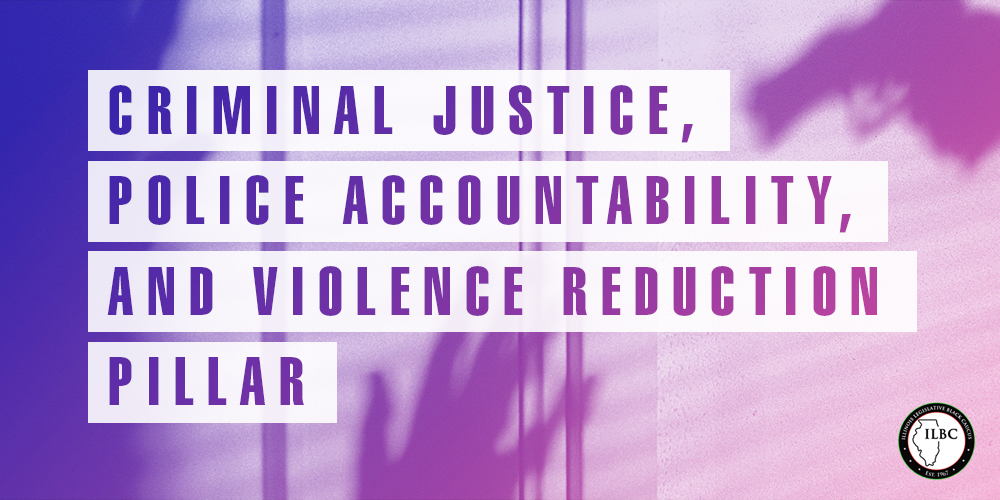- Details
- Category: ILBC Pillars


After the tragic deaths of George Floyd and other members of the Black community last spring sparked widespread protests, the Illinois Legislative Black Caucus seized the moment and embarked on an ambitious plan to dismantle systemic racism in the state of Illinois. After months of hearings, they introduced legislation to reform four key pillars of Illinois of government: criminal justice; education and workforce development; economic access, equity, and opportunity; and health care and human services.
- Details
- Category: ILBC Pillars


The criminal justice reform pillar was written to increase public safety for everyone while dismantling the systems that hold Black people back from achieving their full potential, as well as increasing trust between law enforcement and the Black community.
The culmination of nine public hearings and over 30 hours of testimony, it focuses on police accountability, including police training, limits on the use of force, and increased transparency and accountability regarding officer misconduct.
Criminal Justice Reform Pillar Fact Sheet (HB3653)
Comprehensive Criminal Justice Reform Package
Sponsor: Senator Elgie R. Sims, Jr. (D-Chicago)
House Bill 3653 enacts the reforms of the Black Caucus’ Criminal Justice policy pillar, the culmination of nine public hearings during which over 30 hours of testimony was gathered by the General Assembly.
This comprehensive criminal justice reform bill makes significant reforms in the areas of police training in everything from crisis intervention tactics to de-escalation, police accountability, transparency in law enforcement and the rights of detainees and prisoners.
What the bill does:
- Modernizes sentencing laws.
- Replaces the cash bail system with a new system that detains all dangerous defendants, regardless of their ability to pay.
- Institutes certification & decertification system statewide for police officers.
- Requires the use of body cameras.
- Reforms crowd control response.
- Amplifies law enforcement training standards.
- Prevents destruction of law enforcement misconduct records.
- Connects substance abuse treatment programs with first responder duties.
- Increases and improves de-escalation and mental health training for law enforcement.
- Creates two police misconduct databases for public viewing and transparency.
- Requires police to develop a plan to protect children during search warrant raids.
- Empowers the attorney general to investigate deaths occurring in police custody.
- Addresses officer wellness and mental health awareness and screenings.
- Bans use of chokeholds and other extreme measures.
- Establishes statewide use of force standards by 2022.
What it does NOT do:
- Defund the police.
- Modify or remove qualified immunity protections for police departments.
- Change or take away collective bargaining rights.
- Does not allow those that are charged with a serious offense and are a risk to a person or the community or is a flight risk to be released.
- Does not prevent a judge from revoking pretrial release.
- Does not alter prison time for individuals serving time for heinous crimes.
Police Accountability
House Bill 3653 includes a number of measures to increase police transparency and accountability. House Bill 3653:
- Requires reporting on deaths in police custody.
- Requires police to provide a predicate offense for resisting arrest. (That is, a reason for why an arrested was occurring in the first place.)
- Expands police training on use of force and crisis intervention, as well as first aid training.
- Requires statewide standards and services for officers to receive regular mental health screenings and assistance, while ensuring that counseling and screenings remain confidential.
- Requires police departments to participate in the FBI’s use of force database and strengthens the requirements for use of deadly force.
- Prohibits chokeholds by police officers.
- Imposes upon police a duty to intervene in the excessive use of force by another officer and to render aid when necessary.
- Enhances whistleblower protections.
- Extends all restrictions of the use of force that apply to law enforcement officers to bounty hunters as well.
- Bans the use of certain military equipment and provides guidance on the use of crowd control measures.
- Requires the maintenance of police misconduct records.
- Requires the use of body cameras statewide by 2025.
- Removes the requirement for sworn affidavits for police misconduct complaints.
- Creates a police decertification process for the commission of certain crimes and conduct.
- Allows the attorney general to investigate patterns and practices of misconduct within Illinois law enforcement agencies.
Detainee, prisoner, and citizens’ rights
Several measures in HB 3653 are aimed at reforming detainee and prisoner rights, and to ensure Illinois’ criminal justice system is fairer for everyone. Among other things, the bill:
- Increases services and programming for pregnant prisoners, and requires medical treatment of prisoners and detainees without unreasonable delay.
- Adds new detainee rights when in police custody including:
- The right to make three free phone calls within three hours of arrival at the police station.
- The ability to retrieve phone numbers contained in their cell phone’s contact list prior to the phone being placed in inventory.
- Requires that an easily seen public notice of these rights be posted in police stations and booking rooms.
- Requires that the telephone number to the public defender or appointed attorney's office must also be displayed.
- In the event a person who is in police custody is transferred to a new place of custody, they have the right to again make a phone call.
- Prohibits people with less than four months on their sentence from being imprisoned and allows them to be diverted to electronic monitoring or another DOC facility or program.
- Ends “prison gerrymandering,” the practice under current law of counting prisoners toward a jurisdiction’s census count rather than their last known address.
- Makes changes to streamline the crime victims compensation process.
- Promotes the use of co-responder models and enhances data collection on mental health crisis response.
- Codifies that the use of force by police as a punishment or retaliation is prohibited.
- Creates new requirements in the event police execute no-knock warrants, including that: (1) each participating member is assigned a body worn camera and is following policies and procedures; (2) steps are taken in planning the search to ensure accuracy and plan for children or other vulnerable people on-site; and (3) if an officer becomes aware the search warrant was executed at an address, unit, or apartment different from the location listed on the search warrant, that member will immediately notify a supervisor who will ensure an internal investigation ensues. These requirements are based on Chicago Police Department reforms.
Military Equipment
Bans the purchase and use of certain military equipment by law enforcement, specifically:
- Tracked armored vehicles
- Weaponized aircraft, vessels, or vehicles
- Firearms and ammunition of .50-caliber or higher
- Grenade launchers
- Bayonets
Law enforcement agencies must also publish notice of any requests for property from a military equipment surplus program.
Court Reforms
HB 3653 also makes a number of changes that specifically affect how people interact with the courts, in ways that aim to interrupt the cycles of recidivism and incarceration in which many Illinois families find themselves. Among those reforms, House Bill 3653:
- Replaces the cash bail system with a new system that detains all dangerous defendants, regardless of their ability to pay.
- Ends the practice of suspending drivers’ licenses for failure to pay.
- Aligns the eligibility for the Mental Health Court or Veterans and Service members Court with the other specialty courts.
- Modernizes earned sentence credits, and shortens mandatory supervised release times for certain offenses.
- Clarifies that the “Felony-murder rule” applies to deaths that happen at the hands of participants in the crime.
- Modernizes the three strikes rules to comply with recent Supreme Court hearings on age and removes non-violent offenses from counting as the three strikes.
- Allows the courts to deviate from mandatory minimums and implement alternate sentencing for certain offenses.
Law Enforcement Decertification
Under current law, a law enforcement officer can only lose their certification if they are convicted of or found guilty of a felony offense or certain misdemeanors. HB 3653 expands the list of misdemeanors which would prohibit a person from becoming a law enforcement officer or result in their decertification. This bill:
- Gives the Illinois Law Enforcement Training Standards Board the discretionary authority to decertify an officer under certain circumstances.
- Outlines the process for receiving and reviewing violations, notice and hearing requirements, and the appeals process.
- Applies to all law enforcement agencies, including the State Police.
- Expands the State Police Merit Board to seven members.
- Requires officers to complete training verification forms.
- Implements two new public databases for transparency.
The following are misdemeanors that would result in decertification for police officers, should they be convicted, found guilty, enter a plea of nolo contendere, or be sentenced to supervision, conditional discharge, or first offender provision:
Existing:
- Criminal Sexual Abuse
- Indecent Solicitation of a Child
- Sexual Exploitation of a Child
- Prostitution, Keeping a Place of Prostitution
- Pimping
- Aggravated Assault
- Criminal Sexual Abuse
- Theft
- Deceptive Practices
- Impersonating a Police Officer
- Keeping a Gambling Place
- Offering a Bribe
- Resisting or Obstructing a Peace Officer
- Escape
- Aiding Escape
- Harassment of Jurors or Witnesses
- Simulating Legal Process
- Advances Prostitution
- Profits from Prostitution
- Manufacture or Delivery of Cannabis
- Delivery of Cannabis on School Grounds
- Solicitation of a sexual act
New:
- Public indecency
- Indecent solicitation of an adult
- Solicitation to meet a child
- Domestic battery (all domestic violence convictions prohibit one from carrying a gun)
- Interfering with the reporting of domestic violence
- Transmission of obscene messages
- Harassment by telephone
- Harassment through electronic communication
- Evidence interference
- Any misdemeanor offenses affecting governmental function such as resisting a peace officer or witness tampering.
The following actions could result in an officer’s decertification at a court’s discretion:
- Committing an act which would constitute an automatic decertification if it were prosecuted as a felony or misdemeanor.
- Using excessive force in violation of state or federal law.
- Failing to intervene to prevent harm from occurring including the not knowingly and willingly refusing to render aid when it is reasonable to administer aid and aid is required.
- Tampering with a dash camera or body-worn camera or directing another for the purpose of concealing, destroying, or altering potential evidence.
- Committing perjury, making a false statement, or knowingly tampering with or fabricating evidence.
- Engaging in unprofessional, unethical, deceptive, deleterious conduct, or practices harmful to the public (including any departure from, or failure to conform to, the minimal standards of acceptable and prevailing practice of an officer).
- Details
- Category: ILBC Pillars


The education and workforce development pillar is meant to dismantle systemic racism within Illinois’ education system – from early childhood through adult learning.
It expands access to Early Childhood Intervention services, creates a uniform kindergarten readiness assessment, matches high school graduation requirements with basic entrance requirements at Illinois’ flagship public university, creates commissions to address how schools teach the history of marginalized groups and address students who have experienced trauma, strengthens university programs meant to help get more minority teachers in the classroom, and more.
Education and Workforce Development Pillar Fact Sheet (HB2170)
Sponsor: Majority Leader Kimberly A. Lightford (D-Maywood)
Early Childhood
- Article 10 - Allows children to continue to access Early Intervention services until the beginning of the school year after they turn 3.
- Article 5 - Codifies the Kindergarten Readiness Assessment.
- Article 40 - Requires the Department of Healthcare and Family Services to make recommendations on how to create a diagnostic system that would allow Medicaid to pay for some Early Intervention services.
- Article 15 - Expresses support for the recommendations of the Illinois Commission on Equitable Early Childhood Education and Care Funding.
- Article 35 - Urges the state to increase the availability of Infant/Early Childhood Mental Health Consultations.
K-12 Education
- Article 50 - Requires two years of laboratory science and a foreign language (or sign language) to graduate high school.
- Article 60 - Adds a one-year course with an intensive computer literacy focus to the required high school curriculum. High schools must also offer at least one elective computer science course.
- Article 65 - Requires schools to automatically enroll students in the next level of advanced coursework if they meet or exceed state standards in that subject matter – including Advanced Placement courses.
- Article 135 - Creates an Inclusive American History Commission to reform the Black history curriculum and curriculums for teaching about other minority groups.
- Article 25 - Creates a Whole Child Task Force to address trauma in children and create an equitable, inclusive, safe, and supportive environment for all children.
- Article 75 - Creates grant-funded Freedom Schools to expand teaching of Black history, the civil rights movement, civic engagement, and leadership.
Higher Education
- Article 100 - Creates English and math placement requirements at community colleges.
- Article 125 - Changes the matching requirement for AIM High scholarships. Allows schools with more than 49% Pell Grant recipients averaged over three years to pay a 20% match, while schools with less must pay a 60% match.
- Article 95 - Supports the Illinois Board of Higher Education’s efforts to identify more race conscious and equitable ways to fund higher education.
School Funding
- Article 85 - Requires the Professional Review Panel to review adequacy target calculations, racial equity, and whether the funding goals are sufficient.
Teacher Training
- Article 120 - Expands and reprioritizes distribution of Minority Teacher of Illinois Scholarships.
- Article 115 - Removes the GPA requirement for Alternative Educator Licensure.
- Article 45 - Urges the Department of Human Services to increase access to supports for teacher credential and degree attainment, with a focus to reducing barriers and increasing minority teacher representation.
- Article 155 - Establishes new definitions for National Board Certified Teachers.
- Article 130 - Urges IBHE and the Illinois Community College Board to create a Major Panel to identify courses that count toward an Education major.
COVID-19 Response
- Article 70 - Requires the P-20 Council to make COVID-19 recovery recommendations.
Other Provisions
- Article 20 - Creates a disaggregated uniform demographic data collection requirement.
- Article 150 - Creates a study to determine the feasibility of consolidating all workforce development programs under a single agency.
- Details
- Category: ILBC Pillars


The economic opportunity pillar is designed to eliminate the Black community’s barriers to economic access, equity, and opportunity.
The legislation addresses banking and investment, economic mobility, small business and entrepreneurship, state procurement and the Business Enterprise Program, industry-specific equity, environmental equity, housing and land use, pay equity and workers’ rights, and capital investments.
Economic Access, Equity and Opportunity Pillar Package Fact Sheet
SB 1980 – SB 1480 – SB 1608 – SB 1792
Sponsor: Senator Christopher Belt (D-Centreville)
Senate Bill 1980
- Property Tax Code
- Each person purchasing property in counties with 3 million or more inhabitants must pay a fee to the respective County Collector for each item purchased, plus an additional sum.
- Housing Authorities Act
- Housing authorities must track data from public housing applicants regarding the total number of applicants, the number of applicants on which a criminal background check was run, and the number of applicants denied, among other things.
- This report must be submitted to the Illinois Criminal Justice Information Authority, which must then compile the reports and report them to the General Assembly and public.
- Changes the word “felon” to “individual with felony conviction” on statutory provisions.
- Requires housing authorities to make individual assessments on the reasonability of concluding whether an applicant would constitute a threat or engage in unlawful activities before refusing to certify or recertify applicants who have been convicted of a controlled substance related offense.
- Requires housing authorities to inform applicants of an impending denial of certification or recertification as well as their right to an impartial hearing to demonstrate that the individual’s particular circumstances warrant they not be denied.
- Requires housing authorities, when conducting assessments, to consider each individual’s mitigating circumstances and provides examples of appropriate circumstances.
Senate Bill 1480
- Human Rights Act
- Prohibits an employer from using conviction record as the basis for hiring discrimination against an applicant unless the employment in question and the criminal offense have “substantial relationship,” or granting or continuing employment poses a safety risk.
- Allows the employer to consider duration, amount, circumstances and severity of convictions, the individual’s age at the time of conviction, and evidence of rehabilitation efforts when making a decision based on conviction record.
- Requires the employer to provide written notice to applicants who’s hiring decisions are denied based on criminal conviction and allow the individual 5 days to respond before a final decision is made.
- Business Corporation Act
- Requires any employer who must file an Employer Information Report with the Equal Employment Opportunity Commission must also submit the same data from that repot to the Illinois Secretary of State.
- Equal Pay Act
- Prohibits the Prohibits the state from contracting with a private business with more than 100 employees that does not have an equal pay certificate.
- An equal pay certificate certifies that
- The company is in compliance with various federal equal rights statutes.
- The average compensation for female employees is not consistently below the average compensation for male employees.
Senate Bill 1608
- State Contract Goals
- Increases Business Enterprise for Minorities, Women, and Persons with Disabilities Act goals for each category.
- Procurement Code
- Requires competitive sealed bids to include commitment to diversity, in addition to price.
- Provides that vendors are not eligible for contract renewals when that vendor has failed to meet goals, unless the state agency has determined that good faith efforts to were made.
- Provides diversity training for procurement staff.
- Requires a state agency or institute of higher learning to file an annual report on its contracts with businesses under BEP, including plans to increase diversity.
- Illinois SBIR/STTR Matching Funds Program
- Reinstates the Illinois Small Business Innovation Research (SBIR) and Small Business Technology Transfer (STTR) Matching Funds Program, which awards grants to startup and research businesses that receive federal grants.
- African Descent-Citizens Commission
- Creates a commission to address issues relating African American descendants of slavery mired in poverty.
- Deposit of State Moneys Act
- Permits the Illinois Treasurer to invest or reinvest certain funds in Community Development Financial Institutions and Minority Depository Institutions.
- Race and Gender Wage Reports
- Amends the CMS Law of the Civil Administrative Code of Illinois to provide that each state agency and institution of higher education shall file an annual report with DCEO giving information about wage earnings of state employees by both race and gender.
- Community Development Loan Guarantee Act
- Provides that the State Treasurer may create a community loan guarantee program with up to $10 million to assist in covering losses of certain development projects.
- Illinois Community Reinvestment Act
- Requires covered financial institutions to meet certain financial services needs of local communities, including low- and moderate-income neighborhoods and areas where there is a lack of access to safe and affordable banking.
- Commission on Equity and Inclusion
- Creates a commission to oversee procurement, with a focus on minority inclusion and diversity.
- Technology Development Act
- Increases the amount of earnings from the Technology Development Account and Technology Account II that can be transferred to the Technology Development Fund and allows them to be used to promote the growth of technology jobs in communities of color.
- Child Care
- Provides that IDHS shall update the Child Care Assistance Program Eligibility Calculator on its website to include a question about whether a family is applying for the first time or trying to redetermine eligibility.
Senate Bill 1792
- Farmer Equity Act
- Requires the Department of Agriculture to conduct a study by Jan. 1, 2022, which examines racial and economic disparities associated with farm ownership and operations.
- Cannabis Equity Commission
- Creates a commission to track and make recommendations relating to minority participation in the cannabis market.
- Predatory Loan Prevention Act
- The act will protect consumers from predatory loans, based on the federal Military Lending act by
- Amending the Payday Loan Act to create more protections for consumers and require more reporting from lenders.
- Including changes to the types of licenses lenders need, actions prohibited by lenders, and changes to loan terms.
- Capping the interest rate for installment loans at 36%.
- Amending the Consumer Installment Loan Act to make changes to the amount that can be charged on an installment loan.
- Removing the provisions exempting Small Consumer Loans from different reporting and interest rate rules.
- Barber, Cosmetology, Esthetics, Hair Braiding, and Nail Technology Act of 1985
- Requires the Department of Financial and Professional Regulation to evaluate discrimination in the state’s beauty supply industry
- The act will protect consumers from predatory loans, based on the federal Military Lending act by
Table of Rate Caps (Before and After)
 [1] All rates are annual percentage rates (APRs) calculated according to the Truth In Lending Act except for loans made to active-duty military, which are calculated according to the Military Lending Act.
[1] All rates are annual percentage rates (APRs) calculated according to the Truth In Lending Act except for loans made to active-duty military, which are calculated according to the Military Lending Act.
[2] All rates are annual percentage rates (APRs) calculated according to the Military Lending Act.
[3] National banks and credit unions are not subject to state rate caps.
Payday loan: Single-payment loan due on the borrower’s next payday.
Installment payday loan: A payday loan payable in installments with a maximum term of 120 days. Payments are due on the borrower’s payday.
Auto Title Loan: Loan secured by borrower’s car title. Average term around 20 months. Failure to pay can result in repossession.
Consumer Loans $4,000 and less (technically “small consumer loans”): Average term about one year.
Consumer Loans greater than $4,000: Terms typically 2-5 years.
Auto Purchase Loans: Loan to purchase an automobile. Average term is around 6 years. Failure to pay can result in repossession.
Loan to Active-Duty Military: The Military Lending Act covers most consumer loans, but the Act protects only active-duty members and their dependents. A veteran, for example, is vulnerable to predatory loans.
- Details
- Category: ILBC Pillars


The health care and human services pillar is primarily focused on creating a more equitable and inclusive health care system in Illinois.
It would put a temporary halt to hospital closures, reform Medicaid managed care organizations, take steps to reduce maternal and infant mortality, improve access to mental health care and substance abuse treatment, and train medical providers to recognize and overcome implicit bias.
Health Care and Human Services Pillar Fact Sheet (HB158)
Sponsor: Majority Caucus Chair Mattie Hunter (D-Chicago)
Hospital and Health Care Reform
- Requires the Illinois Department of Healthcare and Family Services (HFS) to develop a program to encourage coordination between Federally Qualified Health Centers (FQHCs) and hospitals, including but not limited to safety net hospitals, with the goal of increasing care coordination, managing chronic diseases and addressing the social determinants of health by Dec. 31, 2021.
- Allows an employee to use personal sick leave benefits provided by their employer for the personal care of a parent, mother-in-law, father-in-law, grandparent or stepparent.
- Worked with Department of Labor on a definition of personal care to allow them to enforce paid sick leave provisions.
- Allows the Health Facilities and Services Review Board to grant a two month stay on hospital closures.
- Amends the Hospital Licensing Act and the University of Illinois Hospital Act to require hospitals to provide N95 masks as appropriate to serve patients, based on state and federal recommendations and supply chain disruptions.
Managed Care Organizations (MCOs)
- Creates the Medicaid Managed Care Oversight Commission within HFS to evaluate the effectiveness of Illinois' managed care program, and to address inadequate levels of care coordination and care planning under MCOs.
- Creates the Managed Care Oversight Fund as a special fund in the State treasury to be used by HFS to support contracting with women and minority-owned businesses as a part of HFS's Business Enterprise Program requirements.
- Creates the Medicaid Business Opportunity Commission within the HFS to develop a program to support and grow minority, women and persons with disability-owned businesses.
Mental Health/Substance Abuse/Chronic Illness Stigmas
- Prohibits state agencies and law enforcement from enforcing certain penalties when the evidence obtained through seeking medical assistance is the sole basis for a violation of parole, mandatory supervised release, probation, conditional discharge, Department of Children and Family Services (DCFS) investigation or any seizure of property.
- Creates the Sickle Cell Prevention, Care, and Treatment Program under IDPH to provide for the prevention, care and treatment of sickle cell disease and educational materials concerning the disease, specifies which program areas IDPH must develop, and specifies program requirements. The bill also creates the Sickle Cell Chronic Disease Fund to provide funding for the implementation of the program and, subject to appropriation, requires IDPH to conduct a study on the prevalence, impact and needs of individuals with sickle cell disease.
Maternal Mortality
- Creates a safety net hospital grant program of $50 million, subject to appropriation, to preserve or enhance OB/GYN services or other specialty services at the receiving hospital.
- Requires the Department of Human Services to update the Child Care Assistance Program Eligibility Calculator to include a question on whether the family is applying for child care assistance for the first time or for redetermination.
- Requires prenatal doula services and evidence-based home visiting program services to be covered under Medicaid.
Equity-Centered Analysis/Reform/ Training
- Creates the Health and Human Services Taskforce to undertake a systematic review of health and human service departments and programs, with the goal of improving health and human service outcomes for Illinois residents.
- Creates an Anti-Racism Commission to review all portions of codified state laws through the lens of racial equity and recommend and advocate for policies that improve health in Black and Brown communities and support local, state, regional and federal initiatives that advance efforts to dismantle systemic racism.
- Creates a Special Commission on Gynecological Cancers to establish a mechanism to determine the prevalence of gynecologic cancers and collect statistics relative to the timing of diagnosis and associated risk factors.
- Requires the Department of Public Health to present the General Assembly with a State Health Assessment and State Health Improvement plan that assesses and recommends priorities and strategies to improve the public health system, reduce health disparities and promote health equity.
- Requires health care professionals who have continuing education requirements to complete at least a one-hour course in implicit bias training per renewal period for license or registration renewals occurring on or after January 1, 2022.
- Creates the Racial Impact Note to require every bill in the General Assembly that could have an impact on racial and ethnic minorities to have a brief explanatory statement or note assessing its impact.







